Between the mid-1930s and the 1960s French actor Jean Tissier (1896-1973) played in more than 200 films. Because of his excellent supporting roles of naive, bumbling, shy, sometimes disturbing characters, he was nicknamed 'le nonchalant qui passe'.
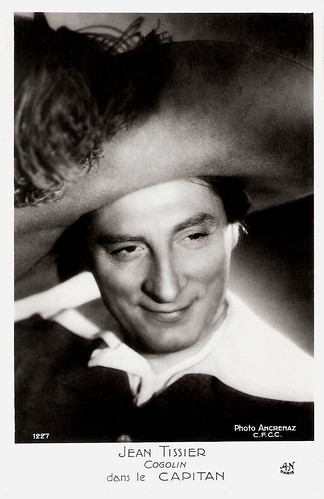
French postcard by A.N., Paris, no. 1227. Photo: Ancrenaz / C.F.C.C. Publicity still for Le Capitan (1946, Robert Vernay) with Jean Tissier as Cogolin.
Nonchalant Air and Stunned Gaze
Jean Tissier or simply Tissier was born in Paris in 1896. He was the son of a single mother who did not recognize him officially until 1941. At 17, he began his career as a journalist. Soon, he became attracted to the theater and he made his stage debut at the side of the famous stage actress Réjane. He performed in such plays as La Puce à l'oreille (Flea in Her Ear), Jean de la Lune (Jean of the Moon), and L'Inconnue d'Arras (The Unknown Woman of Arras). His first film appearance was a small role in Napoléon/Napoleon (1927, Abel Gance). After a hiatus of eight years he returned in the cinema in the sound film Le monde où l'on s'ennuie/The World Where You get Bored (1934, Jean de Marguénat) with André Luguet. Also in 1934, he married Louise Georgette Lalire and that same year he made with her the comedy Le voyage imprévu/Slipper Episode (1935, Jean de Limur) starring Roger Tréville. From then he permanently worked in the cinema and would make more than 200 films. Among his better known films of the 1930’s are the comedies Un oiseau rare/A Rare Bird (1935, Richard Pottier) with Pierre Renoir, Messieurs les ronds de cuir/The Bureaucrats (1937, Yves Mirande) starring Lucien Baroux, and the historical drama L'affaire du courrier de Lyon/Courier of Lyons (1937, Claude Autant-Lara, Maurice Lehmann) with Pierre Blanchar. With his nonchalant air, his stunned gaze and his sly, drawling diction, Jean Tissier became one of the great comic character actors in the tradition of the street theater.
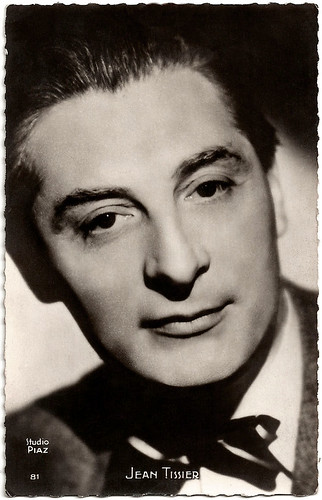
French postcard by Editions P.I., Paris, no. 81. Photo Studio Paz.
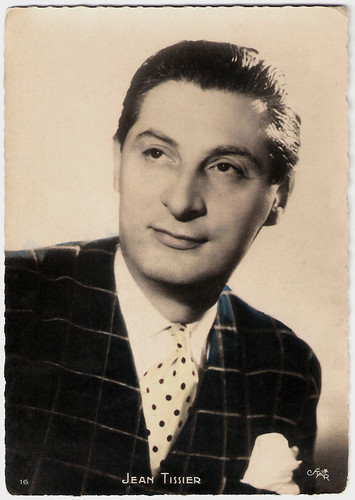
French postcard by Edititions P.I., Paris, no. 16. Photo: Star.
Strange and Intriguing Fakir
During the 1940’s, Jean Tissier became very popular in such films as Le grand élan/They Met on Skis (1940, Christian-Jaque, Harry R. Sokal) with Max Dearly, L'enfer des anges/The Hell of the Angels (1941, Christian-Jaque) with Louise Carletti, and Les inconnus dans la maison/Strangers in the House (1942, Henri Decoin) starring Raimu. His most famous role was that of the strange and intriguing fakir Lallah poor in L'assassin habite au 21/The murderer lives at 21 (1942, Henri-Georges Clouzot) starring Pierre Fresnay. Like many French actors at the time, he often worked for Continental during the Occupation of France by Nazi-Germany. At the end of the 1950’s his success decreased and he mainly played small parts. An exception was Les Cailloux/The Pebbles (1962, Félicien Marceau). In 1971, he appeared for the last time on television in La Visite de la vieille dame/The Visit of the old lady (1971, Alberto Cavalcanti) based on the play by Friedrich Dürrenmatt. That same year he also made his last film appearances in La Veuve Couderc/The Widow Couderc (1971, Pierre Granier-Deferre) with Simone Signoret, and Sex-shop (1972, Claude Berri). Jean Tissier was the widower of Georgette Lalire with whom he had shot a few films for which she had adopted the pseudonym of Georgette Tissier. In 1945, Tissier had written his very funny memoirs Sans maquillage/Without makeup. Despite his impressive filmography, he was destitute at the end of his life. He became hemiplegic (total paralysis of the arm, leg, and trunk on the same side of the body), and in a state of intense depression. He was supported by the association La roue tourne (The wheel turns, a French association to help needful, old artists), which placed him in a retirement home in Granville in November 1972. Jean Tissier died there in 1973, at the age of 76. After his death, the association ensured a decent burial. He was buried in the cemetery of Saint-Ouen next to actress Mireille Balin, who also died in misery.
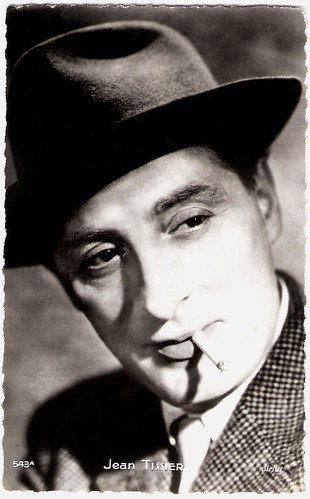
French postcard by Editions Chantal, Rueil, no. 543A. Photo: Sirius.
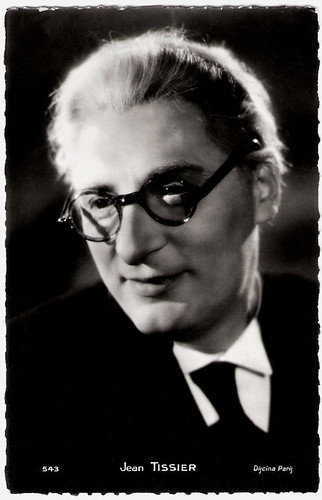
French postcard by Edit. Chantal, Rueil, no. 543. Photo: Discina, Paris.
Sources: Donatienne (L’encinémathèque) (French), Wikipedia (French) and IMDb.

French postcard by A.N., Paris, no. 1227. Photo: Ancrenaz / C.F.C.C. Publicity still for Le Capitan (1946, Robert Vernay) with Jean Tissier as Cogolin.
Nonchalant Air and Stunned Gaze
Jean Tissier or simply Tissier was born in Paris in 1896. He was the son of a single mother who did not recognize him officially until 1941. At 17, he began his career as a journalist. Soon, he became attracted to the theater and he made his stage debut at the side of the famous stage actress Réjane. He performed in such plays as La Puce à l'oreille (Flea in Her Ear), Jean de la Lune (Jean of the Moon), and L'Inconnue d'Arras (The Unknown Woman of Arras). His first film appearance was a small role in Napoléon/Napoleon (1927, Abel Gance). After a hiatus of eight years he returned in the cinema in the sound film Le monde où l'on s'ennuie/The World Where You get Bored (1934, Jean de Marguénat) with André Luguet. Also in 1934, he married Louise Georgette Lalire and that same year he made with her the comedy Le voyage imprévu/Slipper Episode (1935, Jean de Limur) starring Roger Tréville. From then he permanently worked in the cinema and would make more than 200 films. Among his better known films of the 1930’s are the comedies Un oiseau rare/A Rare Bird (1935, Richard Pottier) with Pierre Renoir, Messieurs les ronds de cuir/The Bureaucrats (1937, Yves Mirande) starring Lucien Baroux, and the historical drama L'affaire du courrier de Lyon/Courier of Lyons (1937, Claude Autant-Lara, Maurice Lehmann) with Pierre Blanchar. With his nonchalant air, his stunned gaze and his sly, drawling diction, Jean Tissier became one of the great comic character actors in the tradition of the street theater.

French postcard by Editions P.I., Paris, no. 81. Photo Studio Paz.

French postcard by Edititions P.I., Paris, no. 16. Photo: Star.
Strange and Intriguing Fakir
During the 1940’s, Jean Tissier became very popular in such films as Le grand élan/They Met on Skis (1940, Christian-Jaque, Harry R. Sokal) with Max Dearly, L'enfer des anges/The Hell of the Angels (1941, Christian-Jaque) with Louise Carletti, and Les inconnus dans la maison/Strangers in the House (1942, Henri Decoin) starring Raimu. His most famous role was that of the strange and intriguing fakir Lallah poor in L'assassin habite au 21/The murderer lives at 21 (1942, Henri-Georges Clouzot) starring Pierre Fresnay. Like many French actors at the time, he often worked for Continental during the Occupation of France by Nazi-Germany. At the end of the 1950’s his success decreased and he mainly played small parts. An exception was Les Cailloux/The Pebbles (1962, Félicien Marceau). In 1971, he appeared for the last time on television in La Visite de la vieille dame/The Visit of the old lady (1971, Alberto Cavalcanti) based on the play by Friedrich Dürrenmatt. That same year he also made his last film appearances in La Veuve Couderc/The Widow Couderc (1971, Pierre Granier-Deferre) with Simone Signoret, and Sex-shop (1972, Claude Berri). Jean Tissier was the widower of Georgette Lalire with whom he had shot a few films for which she had adopted the pseudonym of Georgette Tissier. In 1945, Tissier had written his very funny memoirs Sans maquillage/Without makeup. Despite his impressive filmography, he was destitute at the end of his life. He became hemiplegic (total paralysis of the arm, leg, and trunk on the same side of the body), and in a state of intense depression. He was supported by the association La roue tourne (The wheel turns, a French association to help needful, old artists), which placed him in a retirement home in Granville in November 1972. Jean Tissier died there in 1973, at the age of 76. After his death, the association ensured a decent burial. He was buried in the cemetery of Saint-Ouen next to actress Mireille Balin, who also died in misery.

French postcard by Editions Chantal, Rueil, no. 543A. Photo: Sirius.

French postcard by Edit. Chantal, Rueil, no. 543. Photo: Discina, Paris.
Sources: Donatienne (L’encinémathèque) (French), Wikipedia (French) and IMDb.
No comments:
Post a Comment